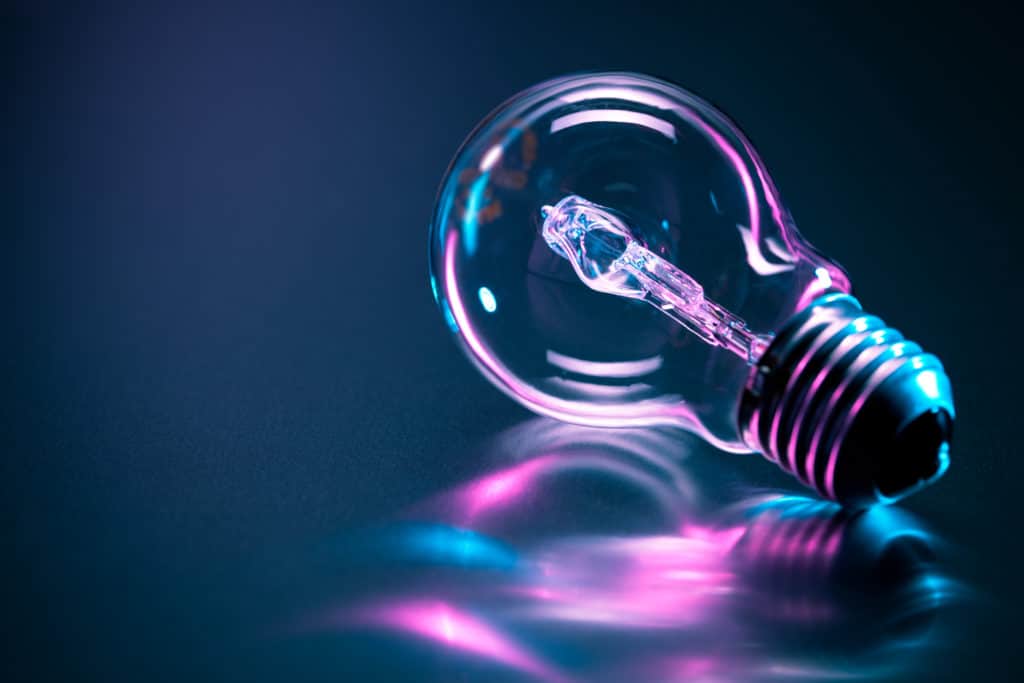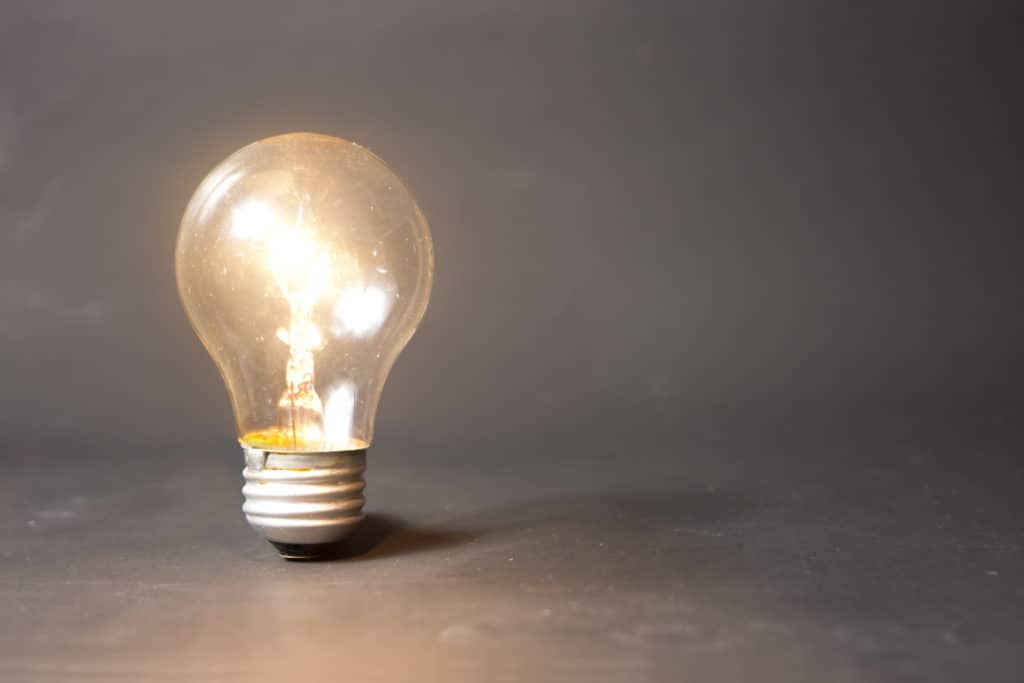If you’ve ever been woken up at 3 am by a light suddenly turning on by itself you’ll know it can be a little frightening, to say the least! When the unexplained happens we all want answers. Are our lights turning on and off by themselves a supernatural issue? a visit from a great great great Uncle perhaps? or is there an electrical reason that can explain the incident away?
This blog post will answer the question “Can Lights Turn On And Off By Themselves?” but only if the question is answerable from an electrical point of view!

So, can lights turn on by themselves?
One of the common reasons for your lights to turn on and off by themselves is the wrong type of bulb. Many older lights are designed to be used with incandescent bulbs, and some newer LEDs can cause them to malfunction. This is just one of several common causes.
Can Lights Turn On and Off by Themselves?
If you’re using a halogen, fluorescent, or LED in your light fittings, it may be causing them to turn on and off without any input from you. Ensuring the use of trusted LED light bulb manufacturers such as these Philips brand ones on Amazon can help elevate problems associated with poor quality bulbs.
One simple way to test whether that’s the case is to switch out your bulb with a standard incandescent one. Alternatively, several LED bulbs are designed to use with dimmers, which are suitable for the majority of older lighter fittings, so you can use those instead of incandescents if you like.
LED lights are known to have higher levels of light flicker than traditional bulbs as referenced in a study by Jiri Draper and published in the Institute of Electrical and Electronics Engineers calling for the introduction of flickermeters
” light flicker (LF) is one of the most important for distribution companies due to customer complaints. It is well known that LED lamps (and CFLs) behave differently from incandescent lamps and that new flickermeters need to be introduced to correctly measure this phenomenon.”
Another potential cause for your lights turning on and off by themselves is faulty wiring or an electrical problem elsewhere in your home. If you have recently tried some DIY electrical work, perhaps adding new lights or repairing existing ones, it’s best to get an electrician in to check the work and make sure it is all safe and meets regulations.
It’s also important to note whether other devices in your home seem to be affected by the power fluctuation as well. If our TVs or other appliances are turning themselves off as well as our lights then the chances are we have a much bigger electrical wiring issue on our hands.
Can Light Switches Turn on by Themselves?
Though it seems the lights in your home are turning on and off by themselves for no reason, this is rarely the case. Lights can turn on and off by themselves because of a technical fault but this usually happens when there is a loose connection in the wires within the switch it is not the switch itself turning on.
The loose connection can be in the light fitting but as switches get a lot of use every day this is the first place the electrician will look to start narrowing down the fault.
This is especially true with LED lights and their associated switches. Since LEDs are much more sensitive to voltage fluctuations than incandescent bulbs it’s pretty common for lights to turn themselves on and off because of electrical or mechanical issues. Better quality LED bulbs, such as these on Amazon, are less sensitive to voltage fluctuations.
If your home is wired with fluorescent or other types of low-wattage lighting, then the problem is most likely caused by a mechanical issue rather than a faulty switch or wiring issue. Old fluorescent fittings have old ballasts and ‘starters’ which regularly need replacing. As these components fail the symptoms are a light that flicks on and off intermittently.
In older homes with incandescent bulbs, the problem could be due to faulty wiring or misaligned switches. Older homes with old electrical circuits would benefit greatly from having the installation inspected by an electrician and a possible rewire if the budget allows.

Why Do My Lights Turn On and Off by Themselves?
If you have one or more lights that are turning on and off at random, check out the following common issues that we come across when responding to these types of faults:
Does a motion sensor control the light?
If so, the lights turning on and off by themselves is normal. These sensors (known as PIR detectors) are designed to automatically turn lights on when motion is detected and off again when there has been no motion for a period of time.
I have seen instances of spiders being attracted to the insects drawn towards the light and triggering the motion sensors. You can check your user’s manual for details about how to adjust the settings.
Are you using a dimmer switch?
Depending on the type of dimmer you have, it could cause lights to flicker or turn off completely if the load placed on the circuit is too high. Dimmer switches are notoriously temperamental and one of the first things an electrician will look at when fault finding.
I’ll link to my preferred all-around LED smart dimmer switch on Amazon here
Are you using CFLs or LEDs?
If so, your light may be rated for use with a dimmer switch, but the dimmer itself may not be compatible. CFLs and some LEDs are designed to work with a specific dimmer switch, so make sure you’re using the correct bulb in the right fixture.
If you’re not using a dimmer, or if you’ve made sure it’s compatible with your bulbs, then it’s time to start looking at the fixture itself. This is where it starts to get a bit more complicated and I would always advise calling in an electrician. They are able to use test equipment to fault find and fix the issue quickly and safely.
Do Appliances Interfere With LED Lights?
Some devices and appliances can create electrical interference, which may affect your lighting in strange ways. Appliances such as radio and television signals can interfere with lighting although it is more common for the LED lights to be the ones interfering with the appliances.
This study titled: ‘Indoor ambient light noise and its effect on wireless optical links’ was published in the IET digital library and can explain the interference reasons much better than I can!
If you think the LED lights are to blame the simplest solution is to try moving these devices away from your lights to see if it helps.
If you’re still experiencing problems after trying all of the suggestions above, here are other possible reasons why your lights turn on and off by themselves:
Why Lights Turn On By Themselves
Weather Conditions
If you live in a place where the weather changes dramatically, this could cause your lights to turn on randomly or too often.
For instance, when the temperature drops below freezing, water droplets may form inside the automatic detection device (PIR) and act as conductors when they come in contact with electrical components, which can cause your light to malfunction. Choosing higher quality PIRs such as these help.
Large Appliances
Large appliances consume high energy when they are used at the same time. The standard electrical circuit cannot handle this kind of load, and thus, it causes the lights to flicker.
Have a licensed electrician inspect your home’s electrical system and fuse board to avoid this from happening. He or she will determine whether or not you need to upgrade your circuits and equipment so that it can handle higher loads.
Poor Connections
A connection problem within the circuit will cause the lights to turn on and off. As well as the common fault of loose cable connections, surge protection devices or GFCI outlets can be damaged by power surges, which can cause them to trip randomly even when they are not overloaded.
A bad connection inside a circuit breaker can also cause flickering lights. It may heat up and trip the breaker when the connection is unstable making it a real fire hazard that should be repaired by a qualified electrician as soon as possible.
Conclusion
We have seen that the answer to the question “What Causes Lights To Turn On And Off By Themselves?” is it depends on the type of light (or lights) in your house. However, most turnoffs can be attributed to faulty wiring, loose connections, and/or bulb failure.
Hopefully, this blog post helped you narrow down the possibilities of what might be causing your lights to flicker!
